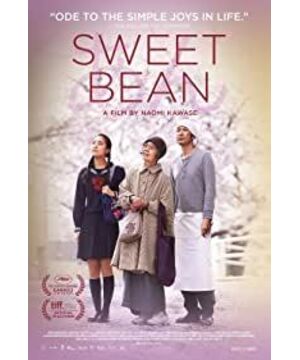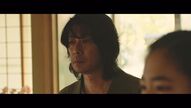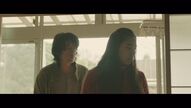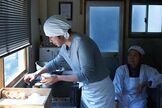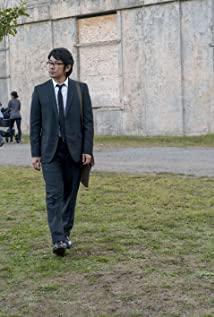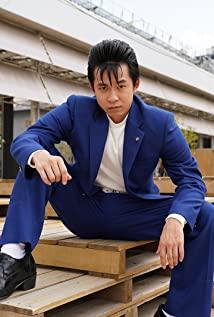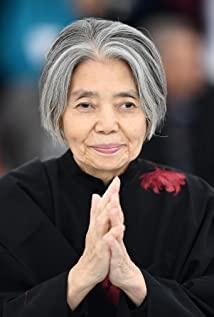People in distress held together to warm themselves, warmed each other, and moved others.
The taste of life is bitter, especially for those in distress. The taste of life is sweet again, like a dorayaki made of red bean paste with sugar. In "The Taste of Sand" directed by Naomi Kawase, Chitaro (played by Masahiro Nagase), the manager of the dorayaki shop, and Wakana, a regular customer in the store and a middle school student, encounter Dejiang (played by Shirin) who is good at making delicious bean paste. Both their lives have turned around since then.
This is a film full of metaphors. Wakana, who is not yet an adult, Chitaro, who is middle-aged, and Dejiang, who is dying, all have their own misfortunes. This means that at any stage of life, people may be shrouded in the shadow of predicament, and even fall into it and cannot extricate themselves. Some of these dilemmas are caused by human character weaknesses and flaws. For example, Chitaro was imprisoned for hurting others, lost his freedom, and lost his mother. After being released from prison, in order to pay off his debts, he sold dorayaki. Some are imposed by fate, people can't choose, let alone get rid of, only accept. Dejiang, for example, has been sent to a nursing home by his family since he was diagnosed with leprosy in his youth, where he spent many decades. Wakana grew up in a single-parent family, her father was absent while she was growing up, and she didn't get the attention of her mother. Some of the shackles that bind them are tangible and tangible, such as the huge debt owed by Chitaro, which limits his range of activities and keeps him busy all day in the dorayaki shop, and the life of Tokujiang. nursing home. Some are intangible and spiritual, such as the discrimination that Tokujiang suffered from leprosy, and the passion for life lost by Chitaro because of debt.
In the film, dorayaki is a metaphor for life, and the three people's attitude towards dorayaki reflects their attitude to life. For Chitaro, since selling dorayaki is just to make a living and has no interest in sweets at all, it is natural to not pay. At the beginning of the film, when he appeared, there was decadence everywhere. Wearing a gray shirt that couldn't be seen old or new, he pushed open the door with a blank expression, dragged his heavy steps, slowly moved to the roof step by step, and lit a cigarette. In the early morning of the new day, everything is full of vigor and vitality, but his eyes looking into the distance are full of confusion that cannot be concealed. After a while, he came to a dimly lit room, changed into work clothes, poured flour, knocked eggs, and stirred. A series of actions revealed extreme reluctance. The schoolgirls who patronized the store joked with him, and he ignored them, expressionless, and sent them away with a free dorayaki. For this middle-aged man who was in a desperate situation, it was difficult to change the status quo. The days in the future could be seen at a glance, and the rest was only to live in a daze.
Although Chitaro is disheartened, there is a good side in his personality. He served Wakana with milk and dorayaki, and gave her defective dorayaki that did not sell well. Wakana was about to enter when the schoolgirls left the store chatting and laughing. Contrary to her lively and cheerful peers, her face was full of loneliness and restraint, and she lowered her head slightly and said nothing. The family is always deserted, and the mother is irresponsible, and she clearly disagrees with her going to high school. The bleak future is suffocating to think about. In Chitaro's store, eating a dorayaki, the sweet and savory taste can at least temporarily make people forget their troubles and get a little comfort.
When Dejiang first appeared, he wore a light-colored coat and walked slowly. Seeing a dorayaki shop not far away, she couldn't help but stop, raised her head, looked at the branches dancing in the wind and the clusters of pale pink flowers adorning the branches, took a deep breath, revealing a contented expression. expression. When she appeared at the door of the shop, Chitaro was busy and Wakana had not left. As for Dejiang's request to work in the store, Chitaro declined on the grounds of hard work and gave her a dorayaki. Unexpectedly, Dejiang came again. This time, she brought the bean paste she made and insisted on asking Chitaro to try it. At first, Chitaro didn't even look at the bean paste, and threw the box into the trash can. Soon, he realized that he was a bit sloppy, so he picked it up again, lifted the lid, and took a sip.
The box of bean paste left by Dejiang is a metaphor for a ray of hope in despair. At first glance, it is bland and unremarkable, and you can accept it respectfully, and then you can feel its beauty when you calm down and savor it slowly. With the homemade bean paste, Tokue finally makes Chitaro's attitude change. The next employment and partnership are naturally logical. Dejiang, who has been making bean paste for 50 years, really has a set: first pick out the red beans that are not very good, then soak the red beans in water for a long time, then take them out, boil them in a copper pot, and pour them in. In the colander, drain the water, rinse repeatedly with a fine stream of water to remove the bitter taste of the beans, then slowly pour in clean water, turn on the faucet after boiling the pot again, and let the fine stream of water slowly wash away the astringency in the water. After repeated washing, the color of the red beans is much brighter than before. However, it is too early to start cooking the bean paste at this time. After adding sugar and water to the red beans, you have to wait for two hours. When cooking the bean paste, in order to avoid burning the pot, you need to keep turning gently. From beginning to end, Dejiang God was calm and unhurried, while Chitaro, who was standing beside him, was rather impatient. Fortunately, after a busy morning, the bean paste was finally done. The enticing taste made Chitaro, who didn't like sweets, hooked. In his own words, "I finally found a dorayaki that I could eat."
Why is the dorayaki that Chitaro encountered before so hard to swallow? Nine times out of ten, the reason is that the soul of dorayaki, the bean paste, doesn't taste good enough. If you lose your soul, you lose your life. Cooking a pot of delicious bean paste requires hard work and patience. Just like what Dejiang taught Chitaro, through repeated soaking, washing, and boiling, impurities and bitterness are filtered out, and then sugar is added, and after fully soaking, it is boiled. This is how bean paste is made, and so is the way of life. In the face of successive setbacks, if there is nowhere to escape, you might as well add some sugar and try to reduce the bitterness. Even if the happiness is only for a moment, people's mood and attitude towards life will change inadvertently. Emotions are contagious. The bean paste made by Tokujiang was full of praise from the female students who came back again. This time, Chitaro didn't drive them away with a straight face, but smiled and responded to their questions with a gesture. Wakana, who was with them, also showed a rare smile.
It should come, sooner or later. With the increasing popularity of Dorayaki, rumors about Dejiang gradually spread. Her secrets, or more precisely, her crooked fingers, became the talk of the crowd. Now, Chitaro's landlord also Can't sit still. Although Chitaro did not dismiss Tokue for this reason, the sales of dorayaki were decreasing day by day, and the store became deserted. In the end, Dejiang left. Chitaro and Wakana go together to visit the Arboretum, the sanatorium where Tokue lives. Dejiang, who returned to the sanatorium, was not as good as before and lost her appetite, which indicated that her death was approaching. Still, she looked excited and recalled a previous experience: being diagnosed with leprosy as a teenager and confined to a nursing home. The shirt that her mother made for her before she left home was taken away by the nursing home. Once married and pregnant, but not able to give birth to a child. After listening to this story, I can finally understand why she is so obsessed with sweets, why she smiles when facing the sun, and why she is full of interest in everything in the world. These are all her ways of fighting the injustice imposed by fate. Be grateful for the beauty in life, feel the rhythm of nature with your heart, and imagine the life of all things in the world. Although the discrimination from the outside will not be reduced because of this, the heart of the person concerned will gradually become stronger and richer, but it can be more Face the cold eyes of people around you well and reduce the degree of injury to yourself.
With this attitude towards life, Dejiang has endured all kinds of unbearable pains in life, and infected Chitaro and Wakana. Shortly after returning from that visit, in the bleak autumn days, Chitaro's landlord was going to drive him away, and he took action. The two came to the Arboretum again, and this time, only Dejiang's friend Kako was the one who received them. Kako gave Chitaro a set of cooking utensils used by Dejiang, and also took out the recordings left by Dejiang. It turned out that Dejiang, who happened to pass by the Dorayaki shop by chance, saw Chitaro's eyes full of sadness, and couldn't help but think of his own similar experience, and of the child he failed to come to the world. If that child is still around, it should be about the same age as Chitaro. This made her think about helping him. As for the name of the Arboretum, it is because the patients living here cannot erect tombstones after death, but can only plant trees. Over time, dense forests have been formed. Dejiang liked cherry blossoms, so after her death, she planted a new cherry blossom. Don't be depressed by the misunderstandings of the world, and live your own style. Such an attitude towards life is full of inspiration to yourself and others.
Setbacks will not disappear because of changes in mentality, but changes in mentality can make people look at and deal with setbacks from a different perspective. At the end of the story, when the cherry blossoms bloom again, Wakana starts her high school life with her schoolbag on her back. Chitaro is still selling dorayaki, but the place where the stall is set up has been changed to under the cherry tree. This time, his expression was full of anticipation. Looking at the crowd watching the flowers in the distance, he hesitated, but he still started to sell loudly. At this point, the film came to an abrupt end. We have reason to believe that his life has since turned a new page.
View more about Sweet Bean reviews


